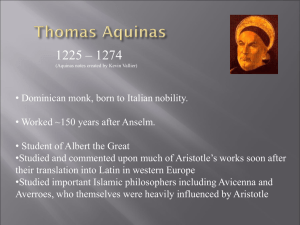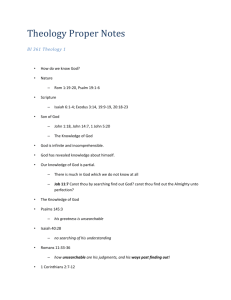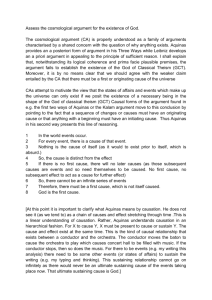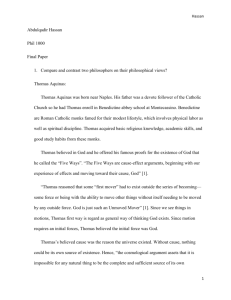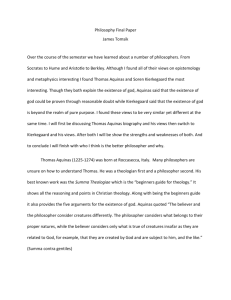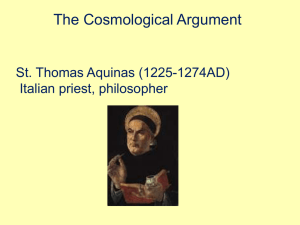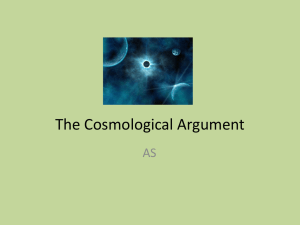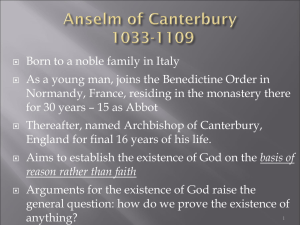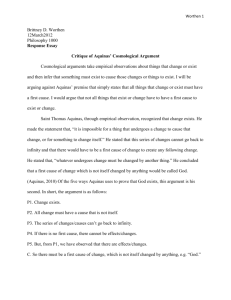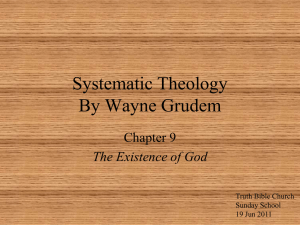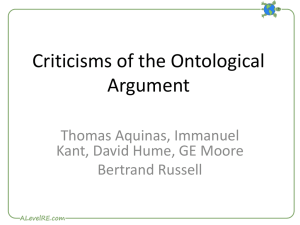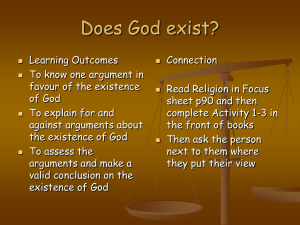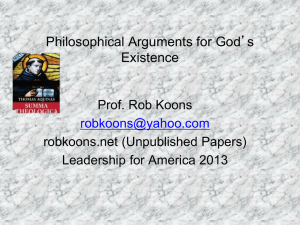Cosmo revision powerpoint
advertisement
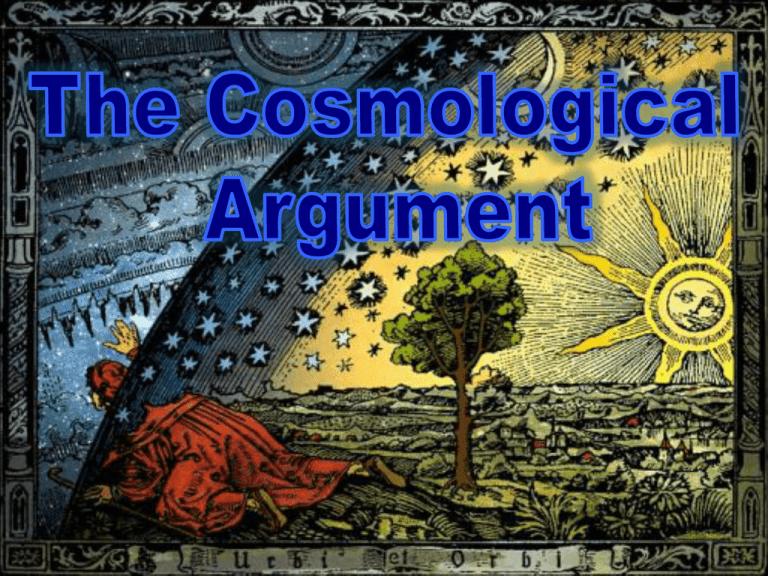
In this book Summa Theologica., Aquinas puts forward five ways to the existence of God. The first three of his ways make up the popular version of the Cosmological Argument. Aquinas believed that “proofs” for the existence of God are needed because the existence of God is not self-evident – it is not obvious that God exists and it is quite easy to think of the world existing without God. Everything that moves is moved by something else; That mover must also be moved by something else; But you cannot have an infinite chain of movers, or there would be no reason for movement to get started at all; Therefore, there must be an unmoved mover, producing movement in everything, without itself being moved; This unmoved mover is what people understand to be God. Potential Actual Wood is potentially hot. Fire is actually hot Change Fire makes the potentially hot wood actually hot. Everything has a cause; Every cause has its own cause; You can not have an infinite number of causes; Therefore there must be an uncaused cause, which causes everything to happen without itself being caused by anything else; Such an uncaused cause is what people understand by “God.” First efficient cause Intermediate cause Ultimate cause Ordinary things start to exist and later stop existing (they are finite or contingent) Therefore at some time none of them was in existence; But something only comes into existence by being caused by something else that already exists; Therefore there must be a being whose existence is necessary and therefore not limited by time. This being is what people understand by God. Copleston states that the existence of contingent things can only be explained if we accept that there is a being with necessary existence who started off the chain of all other existent things. There must, Copleston argues, be a sufficient explanation for the existence of all contingent things and this must be God, who contains within himself the reason for his existence. “...in order to explain existence, we must come to a being which contains within itself the reason for its own existence, that is to say, that which cannot not exist.” “If you suppose the world eternal, you will suppose nothing but a succession of states and will not find in any of them a sufficient reason.” Leibniz believed that the existence of the universe requires a sufficient reason. •Everything that begins to exist has a cause for its existence; •The universe began to exist; •Therefore the universe must have a cause. Rejection of Infinite Regression: •An actual infinite number can not exist; •Therefore, the series of causes for the world being as it is now cannot be an infinite temporal (worldly) sequence; •So, the sequences of causes in the world can not be infinite; •Therefore, the world began to exist at some point in the past. •There was a time in the past when one of two states was possible – that there should be, or should not be, a universe. God is connected to the world as the first mover, first cause, and the One with necessary existence who begins the lives of all those whose existence is contingent. The God of Aquinas’ Cosmological Argument is one who is linked to a world which is ontologically dependent on Him. If God, as the necessary being, stops His creative action, then the world will no longer exist. As God begins the chain of motion and the chain of cause and effect, God can also stop them by withdrawing from the world. Bede Rundle states that the question ‘why is there something rather than nothing?’ is “Philosophy’s central and most perplexing problem.” “Nothing can come of nothing.” Perhaps this argument cannot lead to faith in God, but maybe it doesn’t try to do this; “I am not seeking to understand in order to believe, but believe in order that I may understand.” (Anselm) Aquinas intended the argument to point people towards a belief in God and to suggest that there is evidence for religious faith. It is possible that the Cosmological Argument could bring someone to belief in God or strengthen a religious person’s faith. However, Aquinas himself referred to his ideas of ‘ways’ not ‘proofs’ and so it seems unlikely that an atheist would begin to have religious faith after reading about the Cosmological Argument. As the argument is inductive, the conclusions are not conclusive. Swinburne asserted that the argument makes it very likely that God does exist, but it is doubtful that anyone except a religious believer would be convinced by the argument. There are many flaws in the argument, which have been pointed out in this booklet that could be used by a disbeliever to discredit the argument and maintain their atheistic standpoint. Anselm stated that the argument for God existence are there to enable believers to understand more about their existing faith, rather than bringing atheists to belief in God. We have also seen that the argument points to a necessary being and first mover / cause rather than the God of classical theism. Perhaps thinkers who support the argument can, at best, expect agnostics to lean towards the idea that there might be a ‘sufficient reason’ for the existence of the universe. They can not expect them to be led to the all-powerful, all-loving God of Christianity, as the sufficient reason could be an evil God, or many gods. Therefore, this argument might serve to strengthen existing religious faith and might give believers an argument to justify their belief in God. However, it is unlikely that a person who is not a believer will be drawn to faith in the Christian God by the Cosmological Argument.


